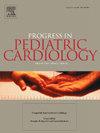先天性心脏手术后持续的乳酸酸中毒:一个强调硫胺素缺乏潜在作用的病例报告
IF 0.8
Q4 PEDIATRICS
引用次数: 0
摘要
乳酸性酸中毒是小儿心脏手术后常见的一种严重的代谢紊乱,通常归因于低心输出量和由此导致的组织灌注不足。然而,硫胺素缺乏会破坏有氧代谢,导致过量的乳酸积累。接受复杂手术干预的婴儿在术后期间有发生硫胺素缺乏症的风险,特别是如果在没有足够补充的情况下给予长时间的肠外营养。病例描述:一个足月女性新生儿被诊断为大动脉转位,在出生后第11天接受了动脉转换手术。她的术后过程因喂养不耐受,疑似坏死性小肠结肠炎(NEC)和延长肠外营养(TPN)而复杂化。尽管排除了败血症和NEC的消退,但持续的乳酸酸中毒和喂养不耐受仍在继续。术后第57天,怀疑硫胺素缺乏,静脉补充治疗。经硫胺治疗后,乳酸水平迅速下降(24 h内从14 mmol/L降至2 mmol/L),临床症状得到缓解。结论本病例说明了在复杂心脏手术后接受延长TPN的新生儿中,硫胺素缺乏可能导致持续性乳酸酸中毒和喂养不耐受,强调了在鉴别诊断中考虑营养缺乏的价值。早期发现和及时补充可显著改善预后,强调在高危术后护理中需要临床意识和常规补充硫胺素。本文章由计算机程序翻译,如有差异,请以英文原文为准。
Prolonged lactic acidosis following congenital cardiac surgery: A case report highlighting the potential role of thiamine deficiency
Background
Lactic acidosis is a critical metabolic derangement frequently observed following pediatric cardiac surgery, often attributed to low cardiac output and resultant tissue hypoperfusion. However, thiamine deficiency can disrupt aerobic metabolism, leading to excessive lactate accumulation. Infants undergoing complex surgical interventions risk developing thiamine deficiency in the postoperative period, especially if prolonged parenteral nutrition is administered without adequate supplementation.
Case description
A full-term female neonate diagnosed with transposition of the great arteries underwent an arterial switch operation on day 11 of life. Her postoperative course was complicated by feeding intolerance, suspected necrotizing enterocolitis (NEC), and prolonged parenteral nutrition (TPN). Despite the resolution of sepsis and NEC being ruled out, persistent lactic acidosis and feeding intolerance continued. On postoperative day 57, thiamine deficiency was suspected and treated with intravenous supplementation. After thiamin therapy, there was a rapid decline in lactate levels (from 14 mmol/L to <2 mmol/L within 24 h) and resolution of clinical symptoms.
Conclusion
This case illustrates how thiamine deficiency may contribute to persistent lactic acidosis and feeding intolerance in neonates receiving prolonged TPN following complex cardiac surgery, underscoring the value of considering nutritional deficiencies in the differential diagnosis. Early recognition and timely supplementation can significantly improve outcomes, emphasizing the need for clinical awareness and routine thiamine supplementation in high-risk postoperative care.
求助全文
通过发布文献求助,成功后即可免费获取论文全文。
去求助
来源期刊

PROGRESS IN PEDIATRIC CARDIOLOGY
PEDIATRICS-
CiteScore
0.90
自引率
11.10%
发文量
69
审稿时长
75 days
期刊介绍:
Progress in Pediatric Cardiology is an international journal of review presenting information and experienced opinion of importance in the understanding and management of cardiovascular diseases in children. Each issue is prepared by one or more Guest Editors and reviews a single subject, allowing for comprehensive presentations of complex, multifaceted or rapidly changing topics of clinical and investigative interest.
 求助内容:
求助内容: 应助结果提醒方式:
应助结果提醒方式:


